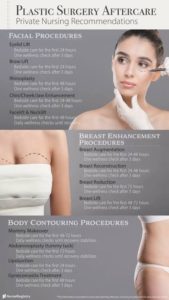After any cosmetic surgery, such as a tummy tuck, breast or facial surgery or even liposuction, it is essential to take care of posture, nutrition and clothing to ensure that the skin is well healed and thus ensuring the desired effect.
Some basic precautions are:

Eat light meals , based on broth, roast and cooked and consume small amounts throughout the day to avoid nausea;
Eat two servings daily of fruit, vegetable broth, or yoghurt with seeds. To maintain bowel function.
Drink at least 1.5 liters of water. or tea to moisturize;
Urinate at least 5 times a day. ;
Rest in a comfortable and appropriate position as per the surgery;
change the bandage at the doctor’s office on time;
Do not remove protective equipment such as a belt, bra or drain, for example, until prescribed by a doctor;
Take the medication prescribed by the doctor. Stick to your dose and schedule to avoid infection and pain;
avoiding exercise in the first week , especially when there are stitches or staples;
Consult your doctor before taking another medication. This is not recommended to see if it does not impair recovery.
In some surgeries, lymphatic drainage sessions may be necessary to help you recover faster. Check out other precautions to take before and after surgery by clicking here, and remember that every surgery has its own care. Learn about some of the precautions to take in the event of a tummy tuck.
Why physical therapy after plastic surgery?
Physiotherapy of the skin is especially indicated after plastic surgery to ensure the acceleration of the healing process and the prevention of complications.
It aims to reduce swelling, maintain movement, improve scarring, and prevent or reduce scar adhesions. In addition, it helps reduce bruising and fibrosis, improves blood circulation and venous return, increases tissue oxygenation, and reduces recovery time after plastic surgery.
Some of the resources used for this purpose are lymphatic drainage, ultrasound, electrical stimulation, cryotherapy, massage and kinesiotherapy, however, the number of sessions depends on the type of surgery and assessment in the immediate postoperative period.
Warning signs to go back to the doctor.
The patient should seek medical help if he is having difficulty breathing, has a dirty dressing, or still has the following symptoms:
Fever;
This does not happen with painkillers prescribed by the doctor.
fluid-filled drain
Pain in the scar or bad smell.
The surgical site is hot, swollen, red, and painful.
In these cases, it is important to consult a doctor, since infection may develop in the scar, antibiotics are not the most appropriate, such as for pulmonary embolism or thrombosis.
It is essential to take precautions to avoid complications, but there are always risks of plastic surgery, such as bruising, infection, or opening stitches. Learn who is most likely to develop complications and what are the main risks of cosmetic surgery

